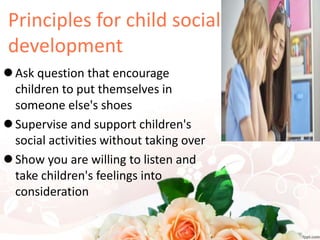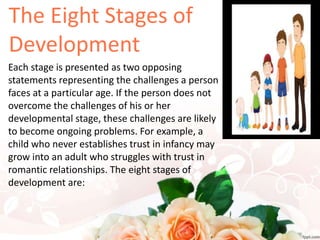Social development
- 2. Social Development Submitted To: Ma’am. Ghulam Zainab Submitted By: Neha Rifaqat 209 Saiqa Anum 210 Mishal Tariq 211 Mudasar Iqbal 212 Course B.ed (Hons) 1st Semester UNIVERSITY OF SARGODHA
- 3. Social development Child development
- 4. Learning Objectives What is social development How to support social development in young children Difficulties occur in children social development How can we remove difficulties
- 5. Social development This involves learning the values, knowledge and skills that enable children to relate to others effectively and ti contribute in positive ways to family, school and the community
- 6. How to support social development in young children Model appropriate social behavior Support self-esteem Build problem solving skills Encourage Exploration Play ! Culture and self concept
- 7. Children learn The language of children's feelings is behaviour Non-verbal language _ smile, look approach Verbal language _ greeting, joining, talking, questions Listening _ taking turns Sensitivity _ how their approach affect others
- 8. Children who can do well Are friendly and optimistic Have group joining skills Make relevent contributions Are interested in others Have a predictive understanding of others reacton to them Positive non verbal interaction
- 9. Social difficulties One third of children bring problems from home One third don't understand how to behave differently One third are bored or in inappropriate environment
- 10. How can we eliminate difficulties Address the cause Safe base (adult) near while the child gains confidence Grouping with socially competent Invite a single peer home
- 11. What parents can do Allow learning from mistakes without ridicule Give private, respectful consequences Let children help set rules Acknowledge that some children test rules and that they unconsciously do so in order to check out how much people care about them and how much they belong
- 12. Principles for child social development Ask question that encourage children to put themselves in someone else's shoes Supervise and support children's social activities without taking over Show you are willing to listen and take children's feelings into consideration
- 13. Social development from infancy to adolescence Erikson's theory Eight stages of social development according to Erikson
- 14. Erick Erikson theory : Erikson’s theory differs from other popular theories in that a person does not have to successfully complete one stage of development to move on to the next stage of development. Erikson’s stages of development are widely taught in psychology courses in the United States.
- 15. Each stage is presented as two opposing statements representing the challenges a person faces at a particular age. If the person does not overcome the challenges of his or her developmental stage, these challenges are likely to become ongoing problems. For example, a child who never establishes trust in infancy may grow into an adult who struggles with trust in romantic relationships. The eight stages of development are:
- 16. 1. Trust vs Mistrust Infancy: Hopes — Trust vs. Mistrust – Infants learn to trust others based upon the response of their caregivers, usually parents.
- 17. 2. Autonomy vs Shame and Doubt Toddlerhood: Will – Autonomy vs. Shame and Doubt – During this phase, young children begin exploring the world around them.
- 18. Cont... If caregivers provide a safe base from which to explore the world and encourage the child’s interests and burgeoning independence, the child will gain a sense of autonomy. Children whose parents or caregivers discourage them or foster excessive dependence may develop feelings of shame.
- 19. 3. Initiative vs Guilt Preschool Years: Purpose – Initiative vs. Guilt – Preschoolers are increasingly focused on doing things themselves and establishing their own goals. When this tendency is nurtured, children grow into adults who are able to take initiative, but when this tendency is undermined, children may be fraught with guilt.
- 20. 4. Industry vs Inferiority Early School Years: Competence – Industry vs. Inferiority – As children grow in independence, they become increasingly aware of themselves as individuals. Children who achieve and are praised for their achievements develop self-confidence and industry, while children who fail to achieve or who are constantly criticized may consistently feel inferior.
- 21. 5. Identity vs Role confusion Adolescence: Fidelity – Identity vs. Role Confusion – The famed term “identity crisis” comes from this period of development. Erikson argued that adolescents undergo an identity crisis during which they must establish an identity, goals, and a purpose.
- 22. Cont... Adolescents who struggle to find a purpose to their lives and a separate identity from their parents and other caregivers may be unable to establish a coherent, consistent identity.
- 23. 6. Intimacy vs Isolation Young Adulthood: Love – Intimacy vs. Isolation – This is the period of development during which many people get married or enter into significant relationships and has been defined as anywhere from 20-24 years to 20-40 years. After a young person has established his or her identity, he/she becomes equipped to establish intimate relationships with others. Failure to do so can result in long-term feelings of isolation
- 24. 7. Generativity vs Stagnation Middle Adulthood: Care – Generativity vs. Stagnation – This is the period of development during which most people have children. People who are able to provide guidance or a legacy to the next generation feel a sense of purpose, while people who do not do so may feel stuck.
- 25. 8. Integrity vs Depair Late Adulthood: Ego Integrity vs. Despair – During this phase, older adults reflect back on the life they have lived. Those who feel fulfilled by their lives are able to face death and aging proudly, while those who feel disappointment may fall into despair
- 26. Social development in primary childhood Development in preschool Role play in primary childhood Peer interaction
- 27. What is role play for children? For children, role play is essentially learning through play. It is a fun and a ‘playful’ activity but is also a key component of a child's learning.
- 28. Cont... Role play is simply a type of pretend play where children get into character and act out a role or real life context. Role play is an active, social activity and children use role play to reflect on and develop their knowledge of a topic.
- 29. Role play in primary schools and nursery There is usually a role play area in pre-school nurseries. This area is often decorated to suit particular topics and props can be left out for children to use and explore.
- 30. Cont... The classic themes are doctors and nurses, police and firemen, teachers and pupils and of course family members such a grand- parents, Mum and Dad and baby.
- 31. 10 key benefits of role play for children Develops communication and language skills Allows children to act out and make sense of real-life situations
- 32. Cont... Allows children to explore, investigate and experiment Develops social skills as children collaborate with others Encourages children to empathises: by taking on the role of character teaches children an understanding of different perspectives.
- 33. Cont... Helps children learn about different cultures Encourages children to express their ideas and feelings in a relaxed environment Develops children's awareness of themselves and others Gets children learning more as learning is disguised as play Sparks creativity and imagination
- 34. Role play develop : role play provides opportunities to develop skills in various different areas of the curriculum for example: numbers, history, culture and many other areas. Role play is a great way to learn at all ages!
- 35. Parent-Child relation Social development is affected by the relationships that the childern have with their parents and other adults as well as with their children.
- 36. Influence on child Social development
- 37. 5 social skills for preschool Understand the difference between right and wrong Explain their feelings and understand other emotions
- 38. Social skills Play independently or in a groups share converse and play with other children's
- 39. Cont... Likes to make decisions for himself, Explore new things
- 41. Who are peer ? The children who share the same age or maturity level
- 42. Peer interaction Throughout childhood and adolescence, peer interaction is essential for language, cognitive, and social development. There are aspects of learning that happen best during peer interactions, rather than interactions with adults.
- 43. Cont... Children acquire language and vocabulary during interactions with others. They learn how to argue, negotiate, and persuade. They must learn to say things without hurting feelings. They must resolve conflicts, apologize, and support.
- 44. Cont.... Peer interaction serves as the foundation for many important aspects of emotional development such as the development of self-concept, self- esteem and identity. Children learn about themselves during interactions with each other and use this information to form a sense of their own selves – who they are.
- 45. Peer relation and interaction During the past three decades, the topic of children's peer relationships has taken a prominent position in the fields of developmental and clinical psychology. This reflects, in part, a growing conviction that children who
- 46. Cont... enjoy strong and positive relationships with peers fare well in their social and academic lives and that those who suffer from peer rejection and friendlessness may be "at risk" for later socioemotional and academic
- 47. Peer relation can cause two types of influences in development process Postive Integration sharing Observation Sensitivity Fairness Negative Being rejected Loneliness Depression Mental disorder Criminal issues
- 48. The sum up of our conversation is This all can be beneficial to set strong foundations for social development early on in a child's life so as they grow up they can understand personal feelings and interact with others positively.
















































